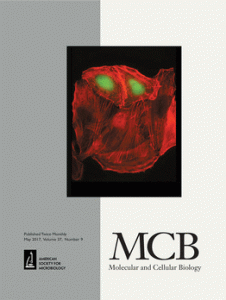In 2014, a journal contacted researcher Denis Rousseau about one of his papers that had just been published online ahead of print, raising some concerns. According to Rousseau, he sent the journal a corrected figure “almost immediately,” which he believed addressed the issue.
Rousseau, a cell biologist at the University Joseph Fourier in Grenoble, France, said he then contacted the journal many times over the next three years to ask about the status of the paper — which never ended up in print — but heard nothing back.
Three years passed.
In March, the publisher finally contacted Rousseau, this time to ask him to issue a formal retraction for the paper. And despite his objections, Molecular and Cellular Biology published a sparse retraction notice, which provides little information about what went wrong:
This article has been retracted.
The journal told us to expect a complete retraction notice in early May.
In the meantime, here’s what we can piece together. According to Rousseau:
The retraction is due to two duplications of lanes, on western blot data, which does not change any of the article.
But Rousseau had thought he’d addressed the issues with the paper when the journal first contacted him in 2014. After waiting for years to learn the status of his manuscript, in March 2017, Rousseau received an email from the ethics manager at the publisher, explaining that the paper came to her attention after it received new PubPeer comments in February. The ethics manager explained that she had also learned of concerns of figure duplication raised back in 2014, after the paper was published online. At that time, the American Society for Microbiology, which publishes the journal, had conducted an internal investigation in which it found evidence supporting several of the allegations. The article was subsequently put on hold and never assigned an issue.
Rousseau was confused by the latest email. According to Rousseau, this was the first time he had seen the 2014 ethics report citing multiple allegations of image duplication:
What is sure is that if i got this report in 2014 i would have [done] all … possible to answer them very properly and correct all the errors.
Rousseau responded to the 2017 email, addressing all the allegations in the ethics report.
Ultimately, however, the publisher and journal decided to retract the paper, and asked Rousseau to resubmit a corrected manuscript to the journal for reconsideration.
Rousseau told us he strongly disagrees with the decision to retract the paper and remains confused about what happened.
We contacted the publisher’s ethics manager for more information, but have not heard back yet.
The paper, “ATAD3 is a limiting factor in mitochondrial biogenesis and adipogenesis of white adipocyte-like 3T3-L1 cells,” has not yet been indexed by Clarivate Analytics’ Web of Science, formerly part of Thomson Reuters.
We’ve also spotted a recent retraction in a different journal by one of Rousseau’s co-authors, which also cites problems with images. Diabetes researcher Jennifer Rieusset, based at INSERM in France, was first author on a now-retracted 2013 Hepatology paper and a middle author on the 2014 Molecular and Cellular Biology paper. In addition to the two retractions, Rieusset has several papers questioned on PubPeer, also alleging image manipulation.
The retraction notice for the Hepatology paper states that the article:
…has been retracted by agreement between the journal’s Editor in Chief, Michael H. Nathanson, the American Association for the Study of Liver Diseases, and Wiley Periodicals, Inc. The retraction is due to concerns relating to the data contained in multiple figures which undermine the overall credibility of the paper.
“Disruption of cyclophilin D–mediated calcium transfer from the endoplasmic reticulum to mitochondria contributes to hepatic endoplasmic reticulum stress and insulin resistance” also has not yet been indexed.
The senior author on the Hepatology paper, Michel Ovize, has one prior retraction — which we’ve covered — after a co-author admitted to manipulating data.
Hat tip: Kerry Grens
Like Retraction Watch? Consider making a tax-deductible contribution to support our growth. You can also follow us on Twitter, like us on Facebook, add us to your RSS reader, sign up on our homepage for an email every time there’s a new post, or subscribe to our daily digest. Click here to review our Comments Policy. For a sneak peek at what we’re working on, click here.

All this time wasted in any kind of commentaries while MCB is guilty to have let me with no answer for 3 years, what to say.
For a tubulin blot used twice by mistake and a spliced WB lane from a PhD.
What to say about this while american research is fighting against lies and tricks in their science.
Nothing to say.
People has wasted their time fighting “against” me while no reason. It is a shame for the science. People speacking bad against me are just not interesting, informed and intelligent, at all.
I do not care my self, i have a permanent position, i never lied and i am efficient always while doing, not speacking for nothing, to waste my time.
People speacking and wondering if we do good research….
What to say
Ignorance is the worse of human being